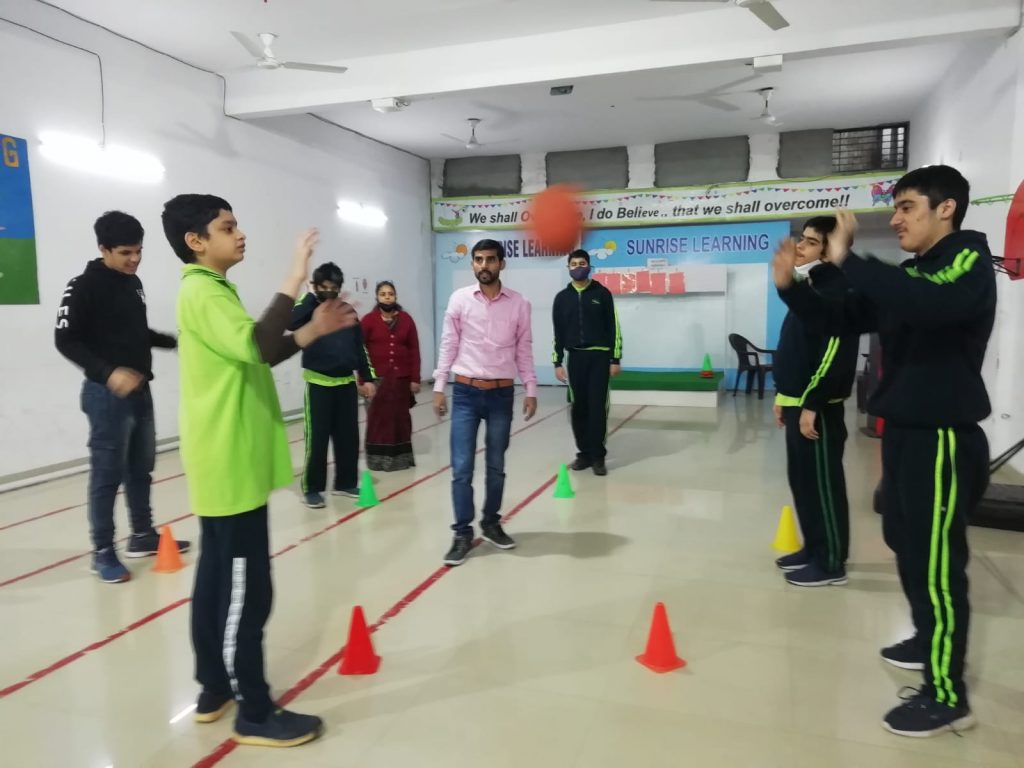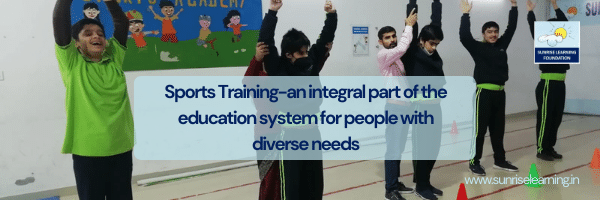Encouraging your special needs child to engage in sports training is a concern for parents. Parents and guardians get worried that their children may get injured. Yet, physical activity is as vital for special needs children as it is for any other youngster.
According to research, special children are less likely to enroll in sports training. As a result, they are more prone to get childhood obesity.
While a growing number of materials has developed. It has made it simpler to involve children with special needs in physical activities. But getting involved in Sports training tops the list.
We have got many insights on this topic, in our journey of Sunrise Learning. Sports training shows an improved lifestyle of children with special needs.
Improving gross motor skills helps control obesity, improving self-esteem and social skills. Encouraging an active lifestyle, and maintaining motivation in various areas of life.
So If you ask us, Sunrise Learning recommends STRUCTURED MOVEMENT/ SENSORY-MOTOR GAMES & SPORTS to be an integral part of the education system, especially for people with diverse needs.
The trainers Mindset in dealing with Special Children

What’s Important?
Need to establish and invite spaces for all, understanding all their strengths & weaknesses. Professionals who are competent are the foundation for developing such settings. This can expand the diversity of sports training for special Children.
A trainer must appreciate diversity and attend diversity training. He/She must put in the effort to get to know the people with whom he or she works.
Inclusion in Sports training is a practical, easy-to-follow guide. It focuses on helping children develop their physical, social, and fitness skills. These tactics also do not need much preparation, setup time, or extra equipment.
How sports training helps people with diverse needs?
Sports training activities provide the physical stimulation that the body & mind needs.
How?
By increasing blood circulation & improving muscle tone & coordination. These activities integrate the senses and generate “well-being” by releasing “happy chemicals” in the brain.
These help in self-regulation, invoking more calmness, composure, better focus, attention, compliance (instruction following), language reception-comprehension & better concentration, and improved sleep habits.
Not only fitness increased productivity and concentration. Sports help people with special needs in the following ways
- Sensory integration
- Reducing hyperexcitability
- Managing Sleep
- Improving tone & motor coordination
- Confidence building to perform
- Learning social skills like teamwork, following rules & instructions & waiting for turns, etc.
- Concepts of start-finish, stop-go, fast-slow, win-lose, etc.
- Improving blood circulation & so better energy levels
- Increased levels of Happiness
- Mental strength to try try and try
Tips on training people with diverse needs for Sports
People with diverse needs encircle a wide spectrum of cognitive, motor, & behavioral difficulties.
Sometimes, they have frequent behaviors. Including the inability to react to one’s own name, poor eye contact, and inappropriate & violent conduct toward others.
1. Consider taking your child’s lead:- Discuss sports options with your child and “involve your Child in the decision-making .” This can aid in your child’s development of self-esteem and independence.
2. Find the right fit:-For every child with special needs, not every sport will be acceptable or safe. For eg. Fast-paced team sports, are not the best sport for every kid with developmental delays. As they need strong hand-eye coordination and on-the-go communication with teammates.
3. Be Creative:- A special needs kid may not want or be able to engage in athletics, but he or she may be able to do so in another way. Coaches may be creative to integrate special needs children into their teams. A child might assist as an equipment manager and indulge in active sports training.
4. Celebrate successes:- Encourage them. For each child, each step is unique.
5. Look for a training program with the right coaching philosophy:- Learning to play as a team, to be patient, to take turns, and to treat their teammates and others with decency, respect, and compassion is more important. Developing game skills is one aspect. The coaching concept should emphasize the player’s social, emotional, and behavioral development.
Final Thoughts
Children with disabilities, like children without impairments, enjoy participation in youth sports.
Opportunities to engage in sports may be significant to children with disabilities. Especially to the ones who attend special courses and schools. As they have limited connections with peers, who do not have impairments in some circumstances.
Unfortunately, many social and environmental restrictions that affect participation in sports are sometimes limited.
We should focus on providing good sports opportunities to children with diverse needs. We should also plan effective involvement for all by assisting trainers. Which will help in understanding and appreciating the individuality of each child. As everyone overcomes their limitations and “gets on the field,” practice and game days will be fun.
If you found this article helpful, do subscribe to us.
[mc4wp_form id=”4687″]
Also do check our amazing article on CONNECT THROUGH PLAY: PLAY as a foundation skill for learning
And If you are new to the world of Autism, Do not miss our article on Welcome To Autism-Land
Sunrise Learning is open to answering all your queries. If you have any questions in mind or are looking for some professional help, do write us at contactus@sunriselearning.in
Thank you for Reading.

